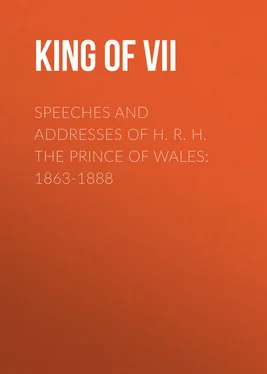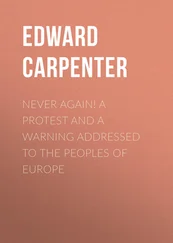Edward VII - Speeches and Addresses of H. R. H. the Prince of Wales - 1863-1888
Здесь есть возможность читать онлайн «Edward VII - Speeches and Addresses of H. R. H. the Prince of Wales - 1863-1888» — ознакомительный отрывок электронной книги совершенно бесплатно, а после прочтения отрывка купить полную версию. В некоторых случаях можно слушать аудио, скачать через торрент в формате fb2 и присутствует краткое содержание. Жанр: История, История, foreign_antique, foreign_prose, на английском языке. Описание произведения, (предисловие) а так же отзывы посетителей доступны на портале библиотеки ЛибКат.
- Название:Speeches and Addresses of H. R. H. the Prince of Wales: 1863-1888
- Автор:
- Жанр:
- Год:неизвестен
- ISBN:нет данных
- Рейтинг книги:3 / 5. Голосов: 1
-
Избранное:Добавить в избранное
- Отзывы:
-
Ваша оценка:
- 60
- 1
- 2
- 3
- 4
- 5
Speeches and Addresses of H. R. H. the Prince of Wales: 1863-1888: краткое содержание, описание и аннотация
Предлагаем к чтению аннотацию, описание, краткое содержание или предисловие (зависит от того, что написал сам автор книги «Speeches and Addresses of H. R. H. the Prince of Wales: 1863-1888»). Если вы не нашли необходимую информацию о книге — напишите в комментариях, мы постараемся отыскать её.
Speeches and Addresses of H. R. H. the Prince of Wales: 1863-1888 — читать онлайн ознакомительный отрывок
Ниже представлен текст книги, разбитый по страницам. Система сохранения места последней прочитанной страницы, позволяет с удобством читать онлайн бесплатно книгу «Speeches and Addresses of H. R. H. the Prince of Wales: 1863-1888», без необходимости каждый раз заново искать на чём Вы остановились. Поставьте закладку, и сможете в любой момент перейти на страницу, на которой закончили чтение.
Интервал:
Закладка:
The Prince was belted with the same sword worn by George IV. In the evening his Excellency the Lord-Lieutenant entertained the Knight, the Royal visitors, and a distinguished company, at dinner in St. Patrick's Hall. In proposing the health of the Prince and the Princess of Wales, the Lord Lieutenant said that "the shouts of acclamation that for four successive days have rung in our ears, will have shown to the illustrious Heir of these Kingdoms, better than any words of mine, the kindly nature of the Irish people, and the attachment that may be awakened in their generous and warm hearts."
His Royal Highness, in returning thanks, said: —
"Your Excellency's, your Royal Highnesses, my Lords, Ladies, and Gentlemen, – In the name of the Princess of Wales and myself, I beg to tender you my warmest thanks for the very kind and flattering manner in which this toast has been proposed, and for the cordial way in which it has been received by the company present here this evening. Under any circumstances I should feel it a great honour to have my health proposed by his Excellency the Lord-Lieutenant, but to-night the circumstances under which it has been proposed are peculiar, for I appear here as a Knight of the Illustrious Order of St. Patrick. I can assure you that I feel very proud to wear this evening for the first time the star and riband of this illustrious Order; and I am very grateful to Her Majesty the Queen for having given it to me. On former occasions I have received the Orders of Great Britain from Her Majesty's own hands; and, although I cannot but regret that on this occasion she has not been able to give this Order to me herself, still it was the Queen's wish that I should receive it on Irish soil, from the hands of her representative, the Lord-Lieutenant.
"This Order was first founded, now more than 80 years ago, by my great-grandfather, King George III., and was instituted by him as a mark of his goodwill and friendship towards this country, and it is my hope that, as his great-grandson, having to-day received it on Irish soil, I may also be instrumental in evincing in this country, in the name of my Sovereign and my mother, her goodwill and friendship towards Ireland. I feel also proud that I have been not only invested with the insignia of this Order, but installed in the magnificent Cathedral of St. Patrick, for the restoration of which we are indebted to the great munificence of a private gentleman of Ireland, whose name is so well known that I need not mention it to you, more particularly as I have the pleasure of seeing him at this table.
"My Lords and Gentlemen, I am very glad to have this opportunity of stating to you, on behalf of the Princess and myself, how deeply gratified we are by the reception which has been accorded to us in this country, not only, as the Lord-Lieutenant has observed, by the higher classes, but by the sons of the soil as well. After the sad times of the past year it might, perhaps, have been thought by some that our reception would not have been all that could have been wished. I myself felt confident that it would, and my hopes have been indeed realised. I beg, therefore, to offer, not only to those present who participated more immediately in our reception, but to the whole Irish people, our thanks for the cordial, hearty, and friendly welcome which we have received. I will not weary you with more words, but thank you once more for the honour you have done us in so heartily drinking our healths."
The Prince, we are told, spoke with an unaffected earnestness which deepened the impression left by his words. The reference to "the sad times of the past year" included the wretched Clerkenwell explosion affair, the perpetrators of which outrage were on their trial in London, at the very time when the people of Dublin were showing their loyal attachment to the throne, and observing the most remarkable order and decorum, even in the most crowded and poverty-stricken districts.
Besides an incessant round of banquets, receptions, concerts, balls, and what are humorously called "entertainments," the Royal visitors devoted much time to inspecting museums, libraries, hospitals, colleges, schools, including some sights not usually attractive to strangers, such as the collections of preparations and curiosities in the College of Surgeons, and the College of Physicians. The antiquities in the Royal Hibernian Academy's rooms were duly inspected; a conversazione at the Royal Dublin Society attended; a flower-show at the Rotunda; The Catholic University in Stephen's Green visited; and above all there were splendid doings at Trinity College, where the Prince (and at the same time, the Duke of Cambridge, and Lord Abercorn) received the investiture of honorary Doctor of Laws. After this the Royal LL.D. went out, unrobed, to unveil the statue of Edmund Burke.
Then there was the Cattle Show, for it happened that the usual spring meeting of the Royal Dublin Society fell at the very time of the Prince's visit. Of course there was also a review in Phœnix Park, and on this occasion the military spectacle was of unusual brilliancy.
On Sunday, the 19th, His Royal Highness attended the service in Christ Church, a cathedral exceeded by few in historic interest.
In addition to the many engagements in Dublin, visits were paid to Lord Powerscourt's beautiful domain, with the romantic and classical scenes of county Wicklow; and to the Duke of Leinster at Carton, and to Maynooth College, fifteen miles off. The President, Dr. Russell, with the officials, formally received the Prince, while the hundreds of students gave him a cheerful welcome in the great quadrangle.
It would occupy too much space to mention all the incidents crowded into the days of the Irish sojourn. They are all recorded in full detail, in the newspapers of the period, and especially in the columns of the Times , who sent a special correspondent to chronicle the events, day by day. In a leading article of the Times , the writer gives a summary of the proceedings, and makes comments on what might be the result of the Royal visit. Some sentences of this article we quote as showing what was the impression made at the time by the Prince himself: —
"Any reader of our daily correspondence could easily make out a hundred distinct occasions during these ten days on which the Prince, most frequently with the Princess, had to be face to face with some portion of the people, in some ceremony or other, and had to perform a part requiring all the graces and gifts of Royalty. There were presentations and receptions; receiving and answering addresses; processions, walking, riding, and driving, in morning, evening, military, academic, and mediæval attire. The Prince was invested as a Knight, robed as an LL.D., and made a Lord of the Irish Privy Council; he had to breakfast, lunch, dine, and sup with more or less publicity every twenty-four hours. He had to go twice to races with fifty or a hundred thousand people about him; to review a small army and make a tour in the Wicklow mountains, of course everywhere receiving addresses under canopies, and dining in state under galleries full of spectators. He visited and inspected institutions, colleges, universities, academies, libraries, and cattle shows. He had to take a very active part in assemblies of from several hundred to several thousand dancers, and always to select for his partners the most important personages. He had to introduce the statue of Burke to the wind and rain of his country. He had to listen to many speeches sufficiently to know when and what to answer. He had to examine with respectful interest pictures, books, antiquities, relics, manuscripts, specimens, bones, fossils, prize beasts, and works of Irish art. He had never to be unequal to the occasion, however different from the last or however like the last, and whatever his disadvantage as to the novelty or the dullness of the matter and the scene. He was always before persons who were there at home, on their own ground, and amid persons and objects familiar to them, and sometimes in a manner made by them. Be it Cardinal, Chancellor, Rector, Mayor, Commanding Officer, President, Chairman, or local deputation, he had to hold his own, without even seeming to do so – that is, without effort or self assertion. All this he had to do continually for ten days. Now, men of common would know what an anxious thing it is to have to do this even once, and how utterly they may be upset by the concurrence of two or three such occasions."
Читать дальшеИнтервал:
Закладка:
Похожие книги на «Speeches and Addresses of H. R. H. the Prince of Wales: 1863-1888»
Представляем Вашему вниманию похожие книги на «Speeches and Addresses of H. R. H. the Prince of Wales: 1863-1888» списком для выбора. Мы отобрали схожую по названию и смыслу литературу в надежде предоставить читателям больше вариантов отыскать новые, интересные, ещё непрочитанные произведения.
Обсуждение, отзывы о книге «Speeches and Addresses of H. R. H. the Prince of Wales: 1863-1888» и просто собственные мнения читателей. Оставьте ваши комментарии, напишите, что Вы думаете о произведении, его смысле или главных героях. Укажите что конкретно понравилось, а что нет, и почему Вы так считаете.












